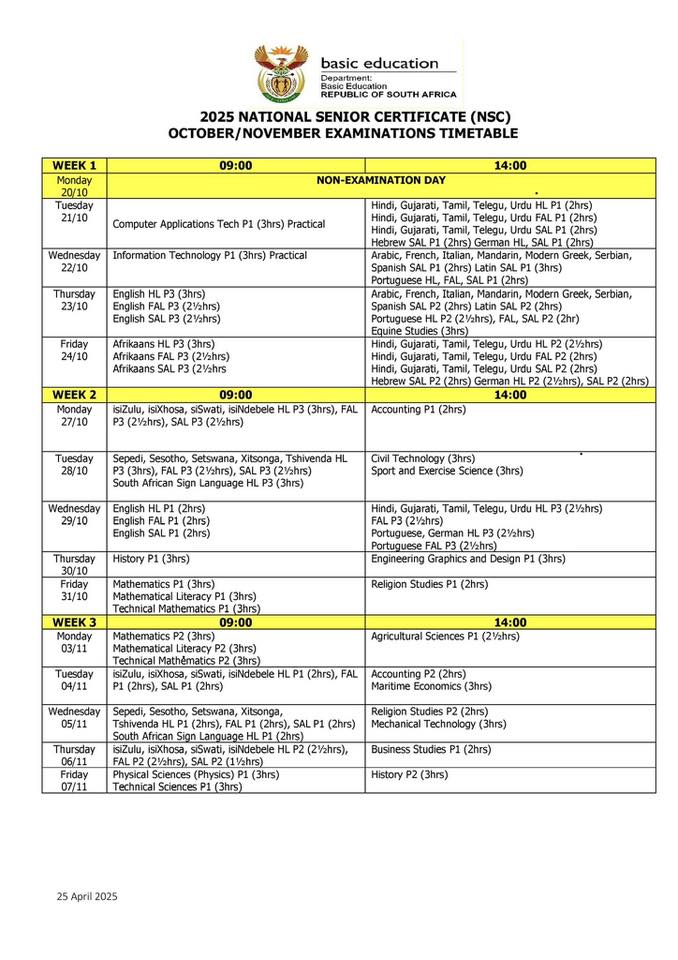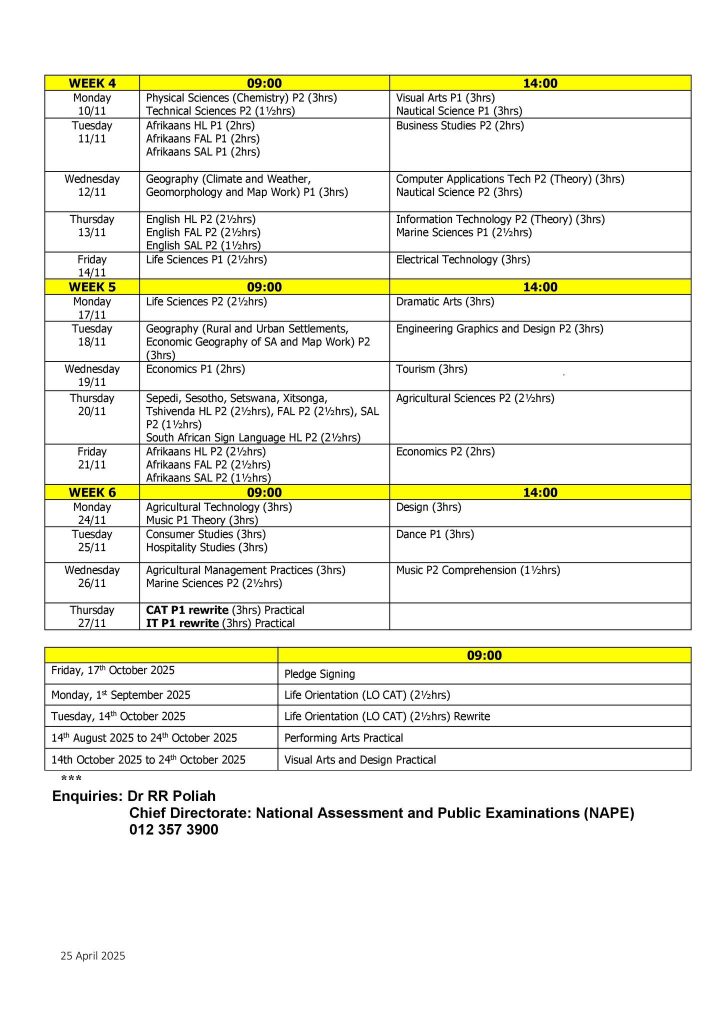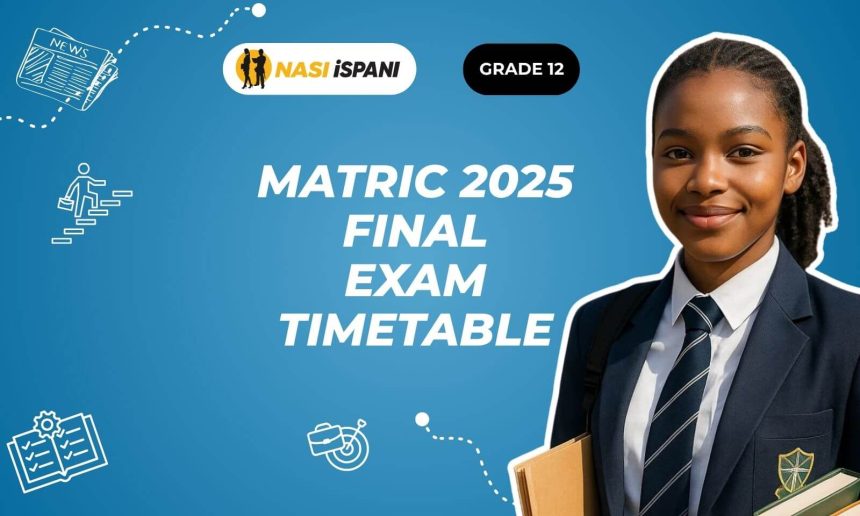2025 Matric Exam Timetable: Full NSC October/November Exam Dates and Key Info
The Department of Basic Education (DBE) has officially released the 2025 Matric Final Exam Timetable and it’s time for every Grade 12 learner to start planning. The National Senior Certificate (NSC) exams are one of the most important milestones in a student’s life, determining entry into universities, colleges, and future careers.
The 2025 matric exams will run from Monday, 20 October to Thursday, 27 November 2025, with practicals and rewrites scheduled for certain subjects. This full timetable gives learners, teachers, and parents enough time to prepare and stay organised ahead of the final stretch of the school year.
Whether you’re searching for when matric exams start, looking to download 2025 NSC timetable PDF, or tips on how to prepare effectively, this guide covers everything you need from key exam dates to study tips, resources, and FAQs.
Key 2025 Exams Dates
The 2025 NSC (National Senior Certificate) exams will take place over a six-week period, covering both theory and practical assessments. The Department of Basic Education has structured the timetable to allow learners enough time between major subjects for revision and rest.
| Exam Phase | Details |
|---|---|
| Exams Begin | Monday, 20 October 2025 (Non-exam administrative day, practicals start 21 October) |
| Exams End | Thursday, 27 November 2025 (includes practical rewrites for CAT & IT) |
| Morning Session | Starts at 09:00 AM |
| Afternoon Session | Starts at 14:00 PM |
| Practical Exams | Selected subjects such as Visual Arts, Design, Music, and Performing Arts will have practical assessments between August and October 2025. |
| Rewrites (CAT & IT) | 27 November 2025, Computer Applications Technology (CAT) and Information Technology (IT) practical rewrites. |
2025 Matric Exam Timetable -Download Below


General Matric Exam Information
Before you dive into the timetable, it’s important to understand how the National Senior Certificate (NSC) exams are structured, what you need to pass, and what to expect during the October/November 2025 exam period.
How the NSC Exams Work
Every matric learner writes a total of seven subjects, divided into compulsory and elective subjects.
| Category | Subjects |
|---|---|
| Compulsory (4) | 1. Home Language 2. First Additional Language 3. Mathematics or Mathematical Literacy 4. Life Orientation |
| Electives (3) | Selected from approved subjects such as Physical Sciences, Life Sciences, History, Geography, Accounting, Business Studies, Tourism, Computer Applications Technology (CAT), Information Technology (IT), etc. |
Each subject is assessed through at least two written papers, and some subjects also include practical or oral components (for example, languages, arts, and technology subjects).
Duration and Paper Format
Most exam papers run between two and three hours, depending on the subject.
For example:
| Subject | Paper Type | Duration |
|---|---|---|
| English Home Language | Writing | 2 hours |
| Mathematics | Theory | 3 hours |
| Life Sciences | Structured & Essay | 2½ hours |
| History | Essay | 3 hours |
| Business Studies | Case Study | 2 hours |
The full exam period spans over several weeks, from 20 October to 27 November 2025, giving learners time between major subjects to rest and revise.
NSC Pass Requirements
To pass matric, you need to meet the Department of Basic Education’s minimum requirements:
| Requirement | Minimum Criteria |
|---|---|
| Home Language | At least 40% |
| Two other subjects | At least 40% each |
| Three remaining subjects | At least 30% each |
| Total subjects | Must pass 6 out of 7 subjects |
However, to qualify for university entrance, learners need higher achievement levels (commonly known as a Bachelor’s Pass).
Types of Matric Passes
| Pass Type | Requirements | Allows You To… |
|---|---|---|
| Bachelor’s Degree Pass | 40% in Home Language, 50% in four high-credit subjects, 30% in two others | Apply to universities for degree programmes |
| Diploma Pass | 40% in Home Language, 40% in four high-credit subjects, 30% in two others | Apply for diplomas or TVET college courses |
| Higher Certificate Pass | 40% in Home Language, 40% in two subjects, 30% in the rest | Apply for certificate-level courses |
| NSC Pass (Minimum) | 40% in Home Language, 30% in two others | Eligible for the Second Chance Programme |
By understanding these structures and pass levels early, learners can set clear study targets and plan their revision strategy around the subjects that carry the most weight for their future studies or careers.
Additional Resources for Matric Students
Preparing for the NSC exams isn’t just about hard work, it’s also about using the right tools.
Below are trusted, free resources to help matric learners across South Africa study smarter and perform their best in 2025.
1. Official Past Exam Papers & Memorandums
The Department of Basic Education (DBE) provides official past exam papers, memos, and marking guidelines — all freely available online.
| Resource | Link | What You’ll Find |
|---|---|---|
| DBE Past Exam Papers | https://www.education.gov.za/Curriculum/NationalSeniorCertificate(NSC)Examinations/NSCPastExaminationpapers.aspx | All Grade 12 NSC papers, marking memos, and exemplars from previous years. |
| Western Cape Education Department (WCED) | https://www.westerncape.gov.za/education/national-senior-certificate-nsc-exams | Digital study guides, past papers, and video lessons. |
| Gauteng Education e-Learning | https://gdecontent.co.za/login/index.php | Provincial past papers and supplementary learning material. |
| KZN Department of Education | https://www.kzneducation.gov.za/index.php/resources/nsc-past-examination-papers | Study notes, past papers, and curriculum support for all subjects. |
Tip: When revising, always use both the paper and its memo to understand how marks are allocated and what examiners expect.
2. Study Guides and eLearning Platforms
Many provincial education portals and NGOs publish free study guides and interactive learning materials to support matric revision.
| Platform | Link | Features |
|---|---|---|
| Western Cape ePortal | wcedeportal.co.za | Download study notes, interactive content, and exam prep guides. |
| Mind the Gap Study Guides (DBE) | education.gov.za | Official DBE-approved guides summarising key content per subject. |
| Siyavula | siyavula.com | Free, adaptive Maths and Physical Science practice with instant feedback. |
| Fundza Literacy Trust | fundza.mobi | English essay writing support, reading materials, and comprehension tips. |
3. Free Mobile Apps for Matric Revision
For learners who prefer studying on the go, several mobile apps offer practice quizzes, notes, and study schedules, all free or low-cost.
| App | Available On | What It Offers |
|---|---|---|
| Matric Live | Android / iOS | Past papers, quizzes, notes, and a full study planner. |
| DigiCampus SA | Android / Web | Interactive lessons and video tutorials for all major subjects. |
| Umalusi App | Android / iOS | Verify certificates and access assessment-related updates. |
| Teacha! Resources | Web / App | Study notes and practice worksheets from South African teachers. |
4. Video Learning Channels & Live Lessons
Visual learning helps many students retain information better. Try these video-based study resources:
| Platform | Content Type |
|---|---|
| SABC Education YouTube | Subject tutorials, interviews with teachers, and exam revision tips. |
| DBE TV Channel (OpenView 122) | Daily matric revision broadcasts and live lessons. |
| MTN Online School | Free video lessons aligned to the CAPS curriculum. |
| TikTok Education Creators | Short, student-friendly summaries (search #Matric2025StudyTips). |
Related: SABC Radio Matric Support Shows: Tune In and Succeed (2025)
Top 10 Study Tips for Matric 2025
Success in the matric exams is not only about hard work but also about smart preparation. Here are ten powerful tips to boost your study sessions:
1. Create a Realistic Study Timetable
Use your official exam schedule as your guide. Plan study sessions around the subjects you’ll write first and those you find most challenging.
- Break your day into 2-hour study blocks.
- Add revision days and rest breaks.
- Keep your timetable visible on your wall or desk.
2. Use Past Exam Papers as Practice
Past papers are your secret weapon. They show how questions are asked and where marks are awarded.
- Focus on the last 3–5 years of papers.
- Practice under exam conditions with a timer.
- Review memorandums to understand marking style.
3. Tackle Weak Areas Early
Instead of revising what you already know, focus on your problem subjects or topics.
- Use your Prelim results to identify gaps.
- Ask teachers for extra help or explanations.
- Join a study group teaching others helps you learn faster.
4. Summarise, Don’t Memorise
Avoid last-minute cramming by making short summaries or mind maps of key concepts.
- Use colours, symbols, or diagrams for visual memory.
- Turn long notes into bullet-point cheat sheets.
- Review summaries during quick daily study sessions.
5. Limit Distractions and Social Media
Social media breaks are fine, but endless scrolling is not.
- Use focus apps like Forest, Pomofocus, or Freedom to stay disciplined.
- Study with your phone on airplane mode or in another room.
- Reward yourself after each focused session.
6. Study Smart with Friends
Form a small, focused study group (3–5 people max).
- Divide topics and teach each other.
- Quiz one another using flashcards or past paper questions.
- Keep sessions short — around 1 hour per subject.
Group study works best when everyone comes prepared!
7. Manage Stress and Look After Yourself
Healthy habits improve focus and memory.
- Get 7–8 hours of sleep each night.
- Eat balanced meals — especially breakfast.
- Take 5-minute breaks every hour.
- Stretch, breathe deeply, or go for a short walk to recharge.
If you feel anxious or burnt out, speak to someone, your teacher, parent, or school counsellor.
8. Use the Pomodoro Technique
This simple method helps you stay focused:
- Study for 25 minutes, rest for 5 minutes.
- After four rounds, take a longer 20–30-minute break.
It’s perfect for avoiding procrastination and improving concentration.
9. Revise Before Bed (and When You Wake Up)
Studies show your brain retains information better when you review key points before sleeping.
- Spend 10–15 minutes revising flashcards or summaries.
- Quickly re-read them in the morning, it helps lock information into memory.
10. Believe in Yourself, You’ve Got This!
Confidence matters as much as preparation.
- Visualise yourself walking into the exam calm and ready.
- Don’t compare your progress to others, focus on your own goals.
- Remember: your matric results don’t define your worth, but how you prepare defines your potential.
“Your best preparation for tomorrow is doing your best today.” — H. Jackson Brown Jr.
Related: How to Improve Your Matric Results in 2025
What to Expect During Exam Sessions
Knowing what is expected on exam day will help reduce stress and avoid mistakes that could cost marks.
Arrival and Preparation
- Be at your exam venue at least 30 minutes before the session begins.
- Carry all the necessary stationery: extra pens, pencils, rulers, erasers, and calculators (if the subject allows).
- Keep your identity document (ID) ready for verification.
- Ensure you are in full, neat school uniform and present yourself tidily.
- Some schools may require covering visible tattoos in line with exam regulations.
Conduct During Exams
The golden rule is simple: do not cheat. Any form of dishonesty, copying, sharing answers, or using unauthorized material, can lead to disqualification and jeopardise your future. Stay calm, focus on your paper, and manage your time wisely.
Frequently Asked Questions (FAQs) – Matric 2025 Exams
1. When will the Matric 2025 exams start and end?
The 2025 matric exams will begin on Monday, 20 October 2025, with practicals starting on 21 October, and will conclude on Thursday, 27 November 2025, including rewrites for IT and CAT practicals.
2. How can I download the 2025 matric exam timetable?
You can download the official NSC matric exam timetable above. Schools may also provide printed copies for learners.
3. What is the NSC matric exam timetable format?
The timetable includes:
- Exam dates for all subjects
- Morning sessions starting at 09:00 and afternoon sessions starting at 14:00
- Practical assessments and rewrites for specific subjects like CAT, IT, and Performing/Visual Arts.
4. Can I write my Matric 2025 exams at a different school?
Yes, with official permission from your provincial education department, but your registration and timetable must be coordinated with your designated examination centre.
5. What happens if I miss a matric exam in 2025?
If you miss an exam due to illness or other valid reasons, you may apply for a special examination or rewrite the subject next year. A medical certificate or official proof is usually required.
6. How do I know which NSC subjects are compulsory?
Every matric learner must take:
- Two languages (Home Language and First Additional Language)
- Mathematics or Mathematical Literacy
- Life Orientation
- Plus three elective subjects based on your school curriculum.
7. What is the minimum requirement to pass matric 2025?
To pass the NSC:
- Home Language: at least 40%
- Two other subjects: at least 40% each
- Remaining subjects: at least 30% each
- Pass 6 out of 7 subjects overall.
8. When will Matric 2025 results be released?
Results are usually released in early January 2026. Official dates will be confirmed by the DBE closer to the release.
9. Are there online resources for 2025 matric exams?
Yes. Learners can use:
- DBE past exam papers and memos
- Provincial portals (Gauteng, Western Cape, KZN)
- Revision apps like Matric Live, Siyavula, and Fundza Literacy Trust
- Radio and TV revision programs
10. Can I check my matric exam venue online?
Yes. Your school will provide your official exam centre, but provincial education websites may also list allocated venues for 2025 matric exams.
11. What are the rules for writing the 2025 matric exams?
- Arrive at least 30 minutes early
- Bring all required stationery and your ID
- Wear full school uniform
- No cheating, copying, or using unauthorized material
12. Are Life Orientation exams included in the 2025 matric timetable?
Yes. The Life Orientation CAT exam is usually written earlier, with a rewrite scheduled before the main October/November exam period. For 2025, Life Orientation CAT is on 1 September 2025, with a rewrite on 14 October 2025.
13. How are practical subjects scheduled in 2025?
Practical assessments like Performing Arts, Visual Arts, Design, CAT, and IT are scheduled separately from written exams. Check your school’s noticeboard or provincial timetable for exact dates.
14. Can I change subjects after registration for matric 2025 exams?
Subject changes are usually only allowed before final registration with the DBE or provincial department. Changes after registration are generally not permitted unless there are exceptional circumstances.
15. What is the difference between NSC and matric exams?
- Matric exams refer to the final Grade 12 assessments.
- NSC exams are the official examinations under the National Senior Certificate curriculum administered by the DBE. Essentially, all matric exams in South Africa are NSC exams.
16. How long should I study each day for matric exams?
Study plans vary per learner, but experts recommend:
- 2–4 focused study sessions per subject per week
- Short breaks between sessions
- More time for weaker subjects closer to exam dates
17. Can I write a matric exam in 2025 if I failed a subject last year?
Yes. Learners who previously failed a subject can register for a rewrite in the current year, provided they meet the registration deadlines set by the DBE or provincial department.
18. Are there study tips specifically for Matric 2025 exams?
Yes. Key strategies include:
- Using past papers and memos
- Creating a personal timetable
- Prioritising weak subjects
- Regular breaks, healthy sleep, and stress management
- Joining study groups
19. Where can I find official 2025 NSC matric exam tips?
The DBE Exam Tips Booklet 2025 provides subject-specific advice, exam preparation strategies, and key content focus areas. It is available on the DBE website.
20. What should I bring to the 2025 matric exams?
- Valid ID
- Required stationery (pens, pencils, rulers, erasers, calculators where allowed)
- Any subject-specific materials required by your school
- Full school uniform
Check also: DStv Offers Matric Exam Support on WhatsApp and Live TV
The 2025 NSC matric timetable provides clarity and structure for learners across South Africa. With exams spread out strategically, students have enough time to balance revision and rest.
Matric 2025 is not just an academic milestone, but also the beginning of new opportunities in higher education and careers. By using the timetable wisely, preparing early, and making use of support resources, learners can approach these exams with confidence.
For the full official timetable, visit the Department of Basic Education’s website or contact your school directly.




